Sad Freight of Mangled Humanity: Arrival of the Wounded of Shiloh at Louisville
On Sunday night, April 13, 1862, Lieutenant Benjamin H. Oberof the 77th Pennsylvania witnessed one of the saddest sights of hisshort military career: the arrival of the steamboat Minnehaha at Louisville,Kentucky carrying a boatload of wounded soldiers from the Shiloh battlefield.He climbed aboard eagerly seeking news of his comrades.
“I walkedthrough the cabins and looked into every suffering face, fearing at every stepto meet the gaze of a wounded comrade with whom I had been so long associatedand with whom I enjoyed so many pleasures and endured so many hardships,” hewrote. “But there were no familiar faces there. It is impossible to describethe sufferings of many of the poor fellows. Some of them were writhing andtwisting, rolling over on their hard couches and uttering piteous groans thatmade the heart ache. Others less severely wounded seemed cheerful and happy andvery ready to communicate all they knew about the battle, which they said wasvery little as after the first attack it was every man for “number one.”
LieutenantOber, a former employee of the Lancaster Daily Evening Express and frequent correspondent, was absent sick from his regiment during the battle, and would soon resign hiscommission scarcely a week later. His letter first appeared in the April 18,1862, edition of the Lancaster Daily Evening Express. I’ve supplementedhis account with articles from the Louisville Daily Journal which alsonot only document the arrival of the Minnehaha, but provide a completelist of names of the wounded who were aboard and what hospital they wereassigned to after arrival.
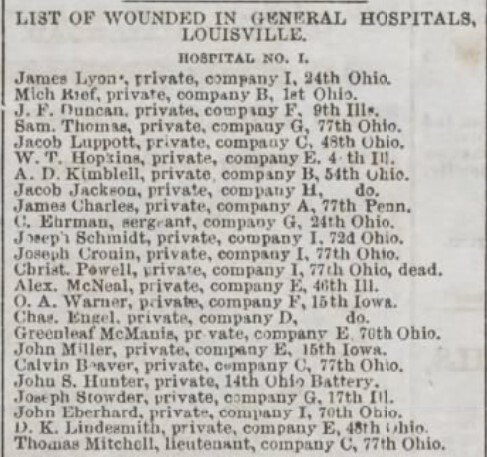 These men, delivered to Hospital No. 1 in Louisville, were among the wounded soldiers of both armies who were aboard the Minnehaha. The remainder of the lists of wounded soldiers, pulled from the Louisville Daily Journal, are at the bottom of the article.
These men, delivered to Hospital No. 1 in Louisville, were among the wounded soldiers of both armies who were aboard the Minnehaha. The remainder of the lists of wounded soldiers, pulled from the Louisville Daily Journal, are at the bottom of the article.Louisville, Kentucky
April 13, 1862
We aregradually getting the facts of the great battle at Pittsburg Landing. The firstaccounts seem, for once, to have been mainly correct with the exception of thenumber of killed and wounded. The first day, everything favored the Confederatesand they were masters of the field. The next, however, we regained our groundand advanced our troops some ten miles further than our first position and sentthe Rebels in full retreat, though in excellent order, in the direction ofCorinth. These are the leading facts and indeed about all the information Icould obtain after questioning and conversing with some 20 wounded officers andmen who were in the thickest of the fight and who arrived in this city duringtoday and this evening.
I was the witnessof a scene this evening which I hope never to look upon again, and, which painfullyillustrates the horrible character of this fratricidal strife. I saw 200wounded soldiers, 60 of whom were Rebels and prisoners, stretched upon the cabinfloor of a steamboat, mutilated and mangled in every conceivable form and manyof them groaning and apparently suffering the most intense agony.
It wasyesterday announced in one of the city papers that several boatloads of thewounded would arrive in the city. The announcement had the effect of attractinghundreds of people to the neighborhood of the levee where the boats wereexpected to stop at an early hour in the morning. As the day wore on, thethrong increased and it finally became so large that it became necessary forthe Provost Marshal to order out several companies of soldiers in order toclear the street. This was accomplished and the crowd was not allowed toapproach within a block of the levee. But still the crowd remained, many ofwhom were women and children, weeping and looking anxiously down the river,hoping the expected boats would bring some tidings of absent friends.
But the daywas passing away and still no signs of the anxiously looked for boats untilnear evening when far down the river, the black smoke of an approaching steamerput everybody on the lookout. The boat finally neared the landed and proved tobe the Minnehaha with 200 wounded as already stated. A half hour beforethe arrival of the boat, I was standing in front of the crowd when the officercommanding the guard noticed me and sent his orderly to invite me within thelines. I very readily accepted the invitation. I was in company with Mr. JamesStewart of your city [Lancaster, Pa.] who has a nephew in the 31stIndiana which was so terribly cut up on the first day of the fight. He was veryanxious to obtain some information concerning the nephew.
As the boatapproached the levee, the neighboring house tops, sheds, and all availableplaces, became crowded with people with the river was alive with skiffs filledwith anxious friends or by those prompted by morbid curiosity. Knowing thatGeneral McCook’s division was in the fight the second day and as my regiment(the 77th Pennsylvania) is in that division, I was very eager tolearn whether it was in the engagement. I made inquiry of several officers andsoldiers who gave their opinion that it was and a private of an Indianaregiment [probably the 29th or 30th Indiana who were inthe same brigade as the 77th- Ed. note] and he assured me that hewas acquainted with the regiment and was sure it was in the fight, but couldnot tell whether there was any wounded on board belonging to it.
“The steamer Minnehaha reached here at a late hourlast night with 240 wounded soldiers from the field at Pittsburg. They wereindiscriminately selected from friends and foes and it is not yet known howmany Rebels were among them. As yet, no list has been made out for the surgeonsand all others who have them in charge are entirely exhausted and werecompelled to seek repose. The wounded were all removed from the boat to thevarious hospitals.” ~Louisville Daily Journal, April 14, 1862, pg. 3
I thereforewalked through the cabins and looked into every suffering face, fearing atevery step to meet the gaze of a wounded comrade with whom I had been so longassociated and with whom I enjoyed so many pleasures and endured so manyhardships. But there were no familiar faces there. The wounded were mostly ofKentucky and Indiana regiments, but there will be several boats in tonight andI was informed that the next will contain the wounded of General McCook’sdivision. If so, tomorrow morning I will have to undergo the painful ordealover again.
It isimpossible to describe the sufferings of many of the poor fellows. Some of themwere writhing and twisting, rolling over on their hard couches and uttering piteousgroans that made the heart ache. Others less severely wounded seemed cheerfuland happy and very ready to communicate all they knew about the battle, whichthey said was very little as after the first attack it was every man for “numberone.”
On April 15,1862, the Louisville Daily Journal published a full list of the “sadfreight of mangled humanity brought to the hospitals of this city on thesteamer Minnehaha on Sunday night. Since their arrival, the followinghave died: Charles Powell, Co. I, 77th Ohio; John Fletcher, Co. H,36th Indiana; Hardin Boyd, Co. C, 4th Kentucky."
Below are thesnapshots for each hospital:
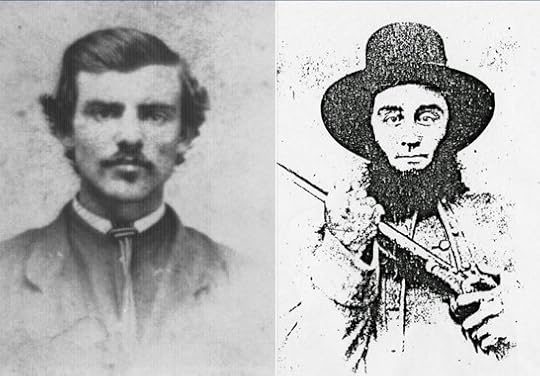 Private William McEnally (left) and Emanuel Fink (right) of the 72nd Ohio were among the wounded soldiers delivered to Louisville by the Minnehaha. Both went to Hospital No. 3- McEnally would survive his wound and return to the regiment; Fink would not.
Private William McEnally (left) and Emanuel Fink (right) of the 72nd Ohio were among the wounded soldiers delivered to Louisville by the Minnehaha. Both went to Hospital No. 3- McEnally would survive his wound and return to the regiment; Fink would not. 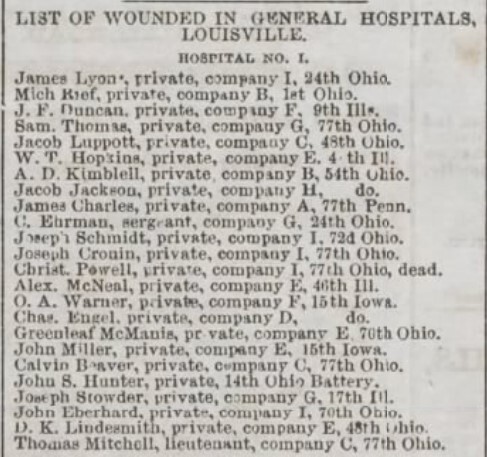
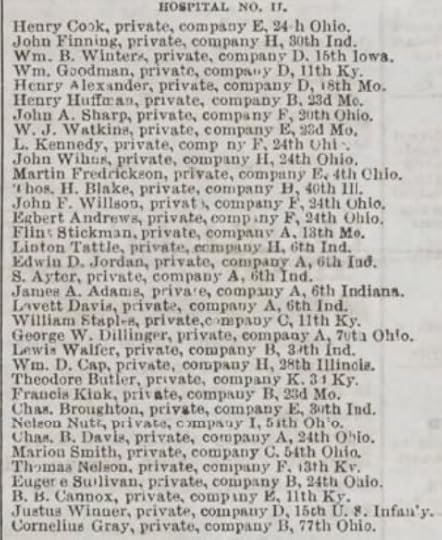
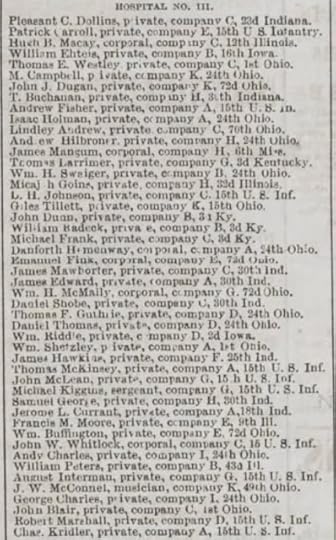
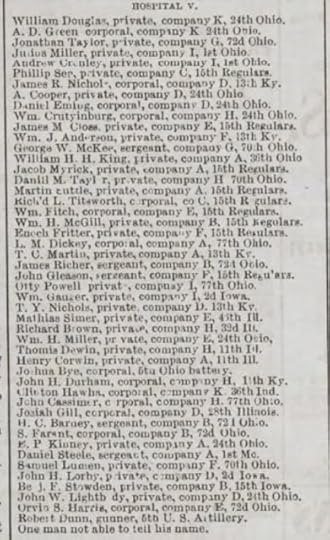
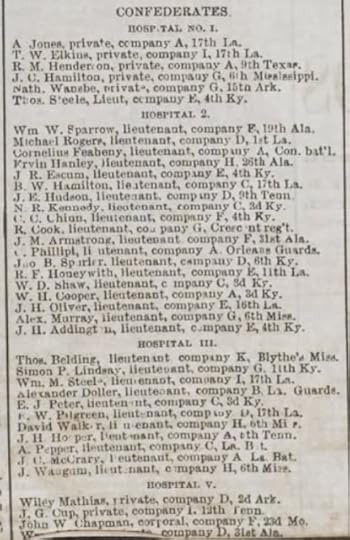
Sources:
Letter from First Lieutenant Benjamin H. Ober, Co. K, 77thPennsylvania Volunteer Infantry, Lancaster Daily Evening Express(Pennsylvania), April 18, 1862, pg. 1
“The steamer Minnehaha,” Louisville Daily Journal(Kentucky), April 14, 1862, pg. 3
“The Pittsburg Wounded,” Louisville Daily Journal(Kentucky), April 15, 1862, pg. 3
Daniel A. Masters's Blog
- Daniel A. Masters's profile
- 1 follower



